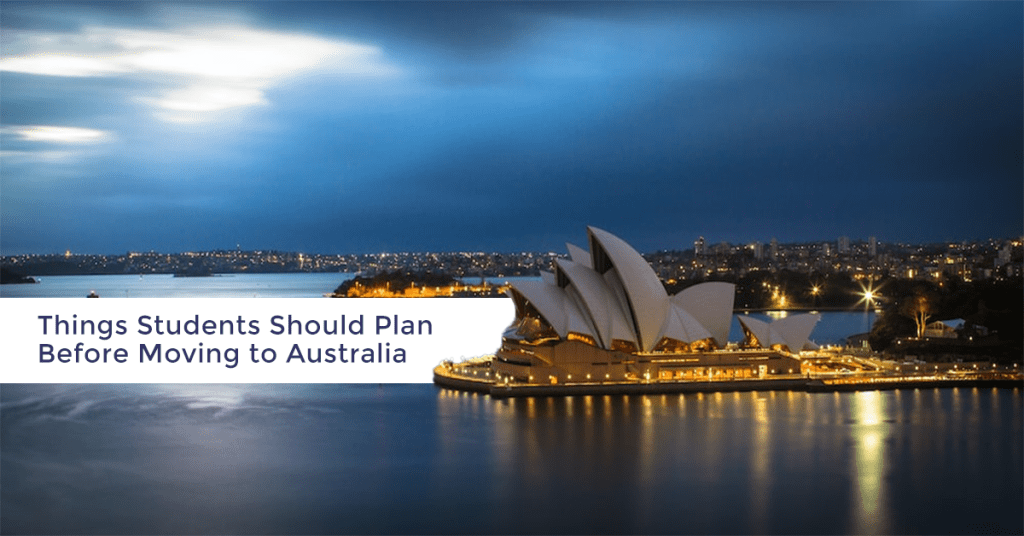Things Students Should Plan Before Moving to Australia
Sep 28, 2023

Introduction
It’s an exciting and transformative experience to relocate to other nations for higher education. Australia, with its top-notch educational system, unique culture, and breathtaking scenery, has emerged as a popular study abroad destination for students from around the world. However, there are a number of crucial factors that students should carefully plan before starting this journey in order to guarantee a good transition and stay. This blog will explain some important factors that students should keep in mind when relocating to Australia.
1. Choosing the Right University and Course
Choosing the appropriate university and subject is one of the first steps in making plans to study in Australia. Evaluate different universities’ standings, offered fields of study, and course structure. Before making a choice, think about your professional aspirations, academic interests, and the institution’s reputation.
2. Student Visa Application
For students planning to go abroad, securing a student visa is crucial. Prepare the required paperwork, do your research on the visa requirements, and apply early. Make sure you are aware of every detail of your visa, such as any restrictions on working off campus or the study requirements.
3. Accommodation
Finding appropriate housing is essential. On-campus accommodation is frequently provided by universities, although off-campus housing choices including shared apartments and home stays are also common. When choosing accommodations, do some research on the cost of living in the city you have picked.
4. Financial Planning
To effectively manage your funds, you must develop a thorough budget. Take into account the cost of education, housing, daily living expenditures, insurance, and possible leisure times. Look into scholarships that can lessen the financial load.
5. Health Insurance
For international students studying in Australia, health insurance is required. To guarantee you have access to medical services and assistance during your stay, look into and acquire Overseas Student Health Cover (OSHC).
6. Cultural Understanding and Adaptation
Australia is renowned for its multiculturalism and open-minded way of life. To aid in cultural adjustment, educate yourself about Australian traditions, regional etiquette, and social customs.
7. Climate and Wardrobe Preparation
The climate in different parts of Australia varies. Pack clothes that are appropriate for the climate in the city you have picked. Keep in mind that the seasons in the Southern Hemisphere are reversed from those in the Northern.
8. Transportation
Learn about the many modes of public transit in your city, including the buses, trains, trams, and ferries. To reduce the expense of commuting, look into the many cities that provide student discounts on public transit.
9. Part-Time Job Opportunities
You can support your money and develop important work experience by working part-time. Examine employment alternatives both on and off campus, and be aware of the hours your visa permits you to work.
10. Networking and Socializing
Creating a social network is crucial for your academic and personal success. To meet new people and make friends, participate in social activities, join student clubs, and attend orientation events.
11. Opening a Bank Account
To effectively manage your finances, open a local bank account as soon as possible. Investigate various banks’ offerings, such as costs and possibilities for foreign transfers.
12. Academic Preparedness
Recognize the standards and prerequisites for the course you have chosen. To guarantee a successful academic journey, familiarize yourself with the grading system, class schedules, and assessment techniques.
13. Time Management and Study Skill
For academic achievement, effective time management and study techniques are essential. Create a plan to balance your personal life, a part-time job (if applicable), and your academic obligations.
14. Language Proficiency
Although English is the primary language of instruction in most courses in Australia, non-native English speakers may still need to pass examinations like the TOEFL or IELTS to demonstrate their language skills. If necessary, get ready in advance and take these tests.
15. Safety and Emergency Contacts
Make sure your safety is a top priority by being familiar with emergency protocols and having the phone numbers for local law enforcement, emergency medical services, and the embassy or consulate of your nation.
16. Technology and Communication
Establish your communication resources, such as a dependable internet connection and a local SIM card for your mobile phone. Maintaining relationships with friends and family back home is crucial for emotional health.
Conclusion
It takes extensive planning and preparation to relocate to Australia for academic study. Students can ensure an easier transfer, a successful academic path, and an enriching experience in Australia by taking into account the many issues included under these subheadings. Remember that your success while studying in Australia will be greatly influenced by your extensive preparation, cultural sensitivity, financial preparedness, and proactive attitude.
For any queries contact us:
Also Visit:
